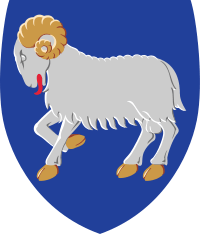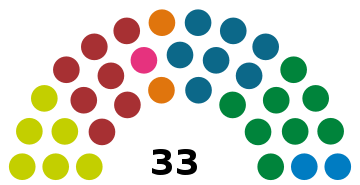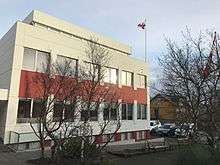Politics of the Faroe Islands
The politics of the Faroe Islands an autonomous country (Danish: land) of the Kingdom of Denmark, function within the framework of a parliamentary representative democratic dependency, whereby the Prime Minister of the Faroe Islands is the head of government,[1] and of a multi-party system. The Faroe Islands are politically associated with the Kingdom of Denmark, but have been self-governing since 1948. Executive power is exercised by the government. Legislative power is vested in both the government and the Løgting. The judiciary is independent of the executive and the legislature and the responsibility of Denmark. As of October 25, 2007, the Faroe Islands became one electoral district.
 |
|---|
| This article is part of a series on the politics and government of the Faroe Islands |
|
|
|
The unity of the Realm
|
|
Regeringen
The Government of Denmark
Landsstýri
The Government of the Faroe Islands
Privy Council
|
Folketinget
Parliament of the Kingdom of Denmark (69th Kingdom Parliament)
|
|
|
Foreign relations
|
|
Related topics
|
Executive branch
| Office | Name | Party | Since |
|---|---|---|---|
| Queen | Margrethe II of Denmark | 14 January 1972 | |
| High Commissioner | Lene Moyell Johansen | May 15, 2017 | |
| Prime Minister | Bárður á Steig Nielsen | Union Party | 16 September 2019 |
The high commissioner is appointed by the Monarch of Denmark. The High Commissioner has a seat in the Løgting, he or she is allowed to speak in the Løgting regarding common Danish/Faroese affairs, but he or she is not allowed to vote.[2] Following legislative elections, the leader of the party that wins the most seats is usually given the initiative to establish a new coalition by the Faroese Parliament, unless the current Løgmaður (Prime Minister in English) is still in power. However, if he or she fails, the Chairman of the parliament asks all chairmen of the parties elected to the parliament, and asks them to point to another chairman who they feel can rightly form a new coalition. The chairman with the most votes is then handed the initiative. After forming the coalition, the Løgmaður leads the landsstýri. The landsstýri will often consist of around 7 members. The coalition parties divide the various ministries among themselves and after this, the parties elect their representative to these ministries. Any other member of the cabinet is called a landsstýrismaður if the person is a man, or landsstýriskvinna if the person is a woman. The word ráðharri is also used for a member of the cabinet, i.e. mentamálaráðharri (minister of culture) or heilsumálaráðharri (minister of health).
Current government
Following the 2019 Faroese general election, a new government, consisting of three parties (Union Party, People party's, and Centre party) under Prime Minister Bárður á Steig Nielsen[3] was created
| Minister | Party | Since | |
|---|---|---|---|
| Prime Minister | Bárður á Steig Nielsen | B | 16 September 2019 |
| Deputy Prime Minister | Jørgen Niclasen | FF | 16 September 2019 |
| Ministry | Minister | Party | Since |
| Ministry of Finance | Jørgen Niclasen | FF | 16 September 2019 |
| Ministry of Health | Kaj Leo Johannesen | B | 16 September 2019 |
| Ministry of Education and Foreign Affairs | Jenis av Rana | MF | 16 September 2019 |
| Ministry of Fisheries | Jacob Vestergaard | FF | 16 September 2019 |
| Ministry of Social Affairs | Elsebeth Mercedis Gunnleygsdóttir | FF | 16 September 2019 |
| Minister of Environment, Industry and Trade | Helgi Abrahamsen | B | 16 September 2019 |
Legislative branch
The Faroese Parliament (Løgtingið in Faroese) has 33 MPs (members of parliament), elected for a four-year term by proportional representation.
Election of 2 seats to the Danish Parliament was last held the 5th of June 2019: Social Democrats 1, Unionist 1.
Political parties and elections
The Faroe Islands have a multi-party system (disputing on independence and unionism as well as left and right), with numerous parties in which no one party often has a chance of gaining power alone, and parties must work with each other to form coalition governments. The Faroese Parliament (Løgting) has 33 seats. Members are elected by popular vote to serve four-year terms. For the Løgting elections there were seven electoral districts, each one comprehending asýslur, while Streymoy is divided in a northern and southern part (Tórshavn region), but since 2008, the Faroes constitute a single district.[4]
 | ||||||||||||||
| Party | Votes | % | +/– | Seats | +/– | |||||||||
|---|---|---|---|---|---|---|---|---|---|---|---|---|---|---|
| People's Party | 8,290 | 24.5 | 8 | |||||||||||
| Social Democratic Party | 7,480 | 22.1 | 7 | |||||||||||
| Union Party | 6,874 | 20.3 | 7 | |||||||||||
| Republic | 6,127 | 18.1 | 6 | |||||||||||
| Centre Party | 1,815 | 5.4 | 2 | |||||||||||
| Progress | 1,559 | 4.6 | 2 | |||||||||||
| New Self-Government | 1,157 | 3.4 | 1 | |||||||||||
| Cannabis Initiative | 310 | 0.9 | New | 0 | New | |||||||||
| Faroese Party | 167 | 0.5 | New | 0 | New | |||||||||
| Invalid/blank votes | 150 | – | – | – | – | |||||||||
| Total | 33,929 | 100 | 0 | 33 | 0 | |||||||||
| Registered voters/turnout | 37,827 | 89.7 | – | – | ||||||||||
| Source: KVF | ||||||||||||||
Administrative divisions
The islands are administratively divided into 30 municipalities[5] with about 120 cities and villages.
Traditionally, there are also the 6 sýslur (Norðoyar, Eysturoy, Streymoy, Vágar, Sandoy and Suðuroy). Sýsla means district and although it is only a police district today, it is still commonly understood as a geographical region. In earlier times, each sýsla had its own ting, the so-called várting (spring ting).
International affairs
The nation continues to be intimately tied with the Nordic countries of Europe and the European Union.

Along with diplomatic missions to Iceland, the Court of St. James's (United Kingdom), Russia and the European Union,[6] the Faroe Islands participate in the Nordic Council, NIB, International Maritime Organization, International Whaling Commission (Complete list of participation of the Faroe Islands in international organisations).
Further reading
- Debes, Hans Jacob. 1988. "Reflections on the Position, Participation and Co-Operation of Small Nations in International Politics Case The Faroe Islands". Nordic Journal of International Law. 573: 365–368.
See also
References
- Mfa.fo, Prime Minister's Office, Government
- Stm.dk, the website of the High Commissioner of the Faroe Islands, as part of the Danish Prime Minister's Office
- Logting.elektron.fo, 5 Uppskot til løgtingslóg um broyting í løgtingslóg um val til Føroya Løgting (in Faroese)
- Sudurras.fo, Allar kommunur í Føroyum savnaðar í eitt kommunufelag Archived 2014-01-02 at the Wayback Machine
- Missions of the Faroes abroad, government.fo (without date).